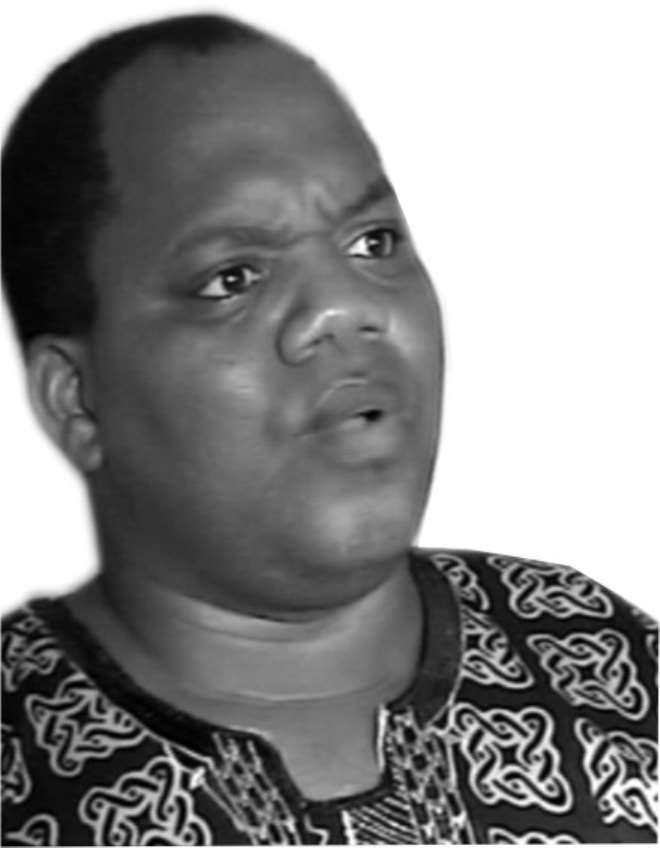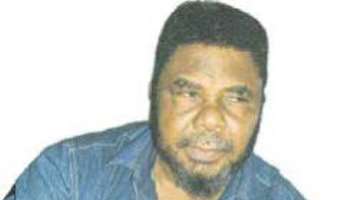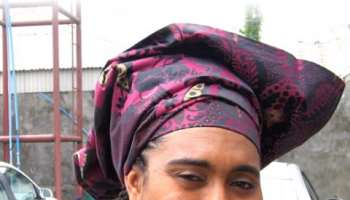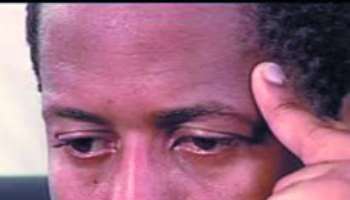I STARTED NOLLYWOOD...ALADE AROMIRE
Round but handsome boss of Yotomi Television, Muyideen Alade Aromire was a frontline actor and movie producer before delving into cable television business.
The light-complexioned Lagos prince, in this interview with WOLE AJAYI, talks about his involvement in the Nigerian movie industry, as well as his experience as a cable TV owner, among others. Enjoy:
I noticed that you left out your title in your introduction. Why?
(Laughs) Title is nothing…
You're often referred to as a prince.
You said so.
So where are you from?
I'm from Lagos.
Are you a Lagos prince?
Yes. My forebears are sole owners of Lagos Island and the surrounding lagoon.
Which of the ruling houses do you belong to?
Aromire.
You were known to be an actor and a movie producer. Why did you veer into cable television business?
It's because only television encompasses the whole thing - movie, music, acting and the rest. I studied film and television productions in Cologne, Western Germany. And since I came back, I'd done some crash courses on Acting in London and Western Germany. When I returned, I wasn't interested in a paid employment, so I asked my father for a loan, which he gladly gave, and ever since, I have started movie-making. I pioneered video movie-making.
Along the line, I was looking for challenges. I just wanted to do something that could…I wanted to be different in a way.
Most actors then were not willing to get trained, they were looking at the industry as a short cut to success. Then you have riff-raffs who are not really ready to make artistic statement. If you watch Yoruba movies now, you'll get pissed off. Of course, except in recent times, when Jide Kosoko became ANTP president. He has been trying to make some changes.
But that is not to say there isn't some nice productions from the sector. The likes of Kelani and Wemimo have been doing a lot, don't you think so?
Wemimo started very recently. He came in earlier, released Ododo Eye and went into politics, and then he came back. Wemimo is not a trained movie maker. He just came in to make money just like some others who thought they've got money and could make more in movie.
Most of them re making movies because they want to eat. And movie-maaking shouldn't be like that. You make a statement with movie. What's happening in Iraq and Iran, Americans had already shot movies about it years back. They're using their movies to make a statement that, “this is America”. When I couldn't realize my vision through the movie, I decided to try it through television. So I started Yotomi Television, which is an all Yoruba Channel. I'm using Yotomi Television to make the Yoruba entity interesting to the outside world.
I want people to say, I'd like to speak Yoruba language.
How has it been so far?
It's been challenging and fun, too.
What problems have you encountered so far?
I don't have any problem. Anything that comes to me in form of a challenge or a problem, I see it as a stepping stone towards going for greater heights. I must tell you, everything that I'm involved in, in terms of entertainment, has been fun to me.
You know, you can't do it properly if you don't get to correct one or two mistakes. And without mistakes, there can't be perfection.
Your expectations have been fulfilled?
Definitely! I'm fulfilled.
How old is Yotomi?
We're just four years now.
There's this controversy surrounding the origin of the home videos film in Nigeria. It is believed in some quarters that Living In Bondage is the first movie to come out of Nollywood.
It can't be! Living In Bondage? No, no, no! Go and ask Kenneth Nnebue. Let me tell you, if you can write it properly, Kenneth Nnebue had produced over 40 Yoruba movies before he even thought of producing an Igbo movie. Living In Bondage is an Igbo movie. It is an Igbo language movie. Probably they want to claim that Living In Bondage is the first Igbo movie. Before he dreamt of making that film, he had produced 40 Yoruba films. He started with Aje Ni'ya Mi. And there had been a flourishing movie industry before he came on board. So how can you say he started it.
So who produced the first home video?
I did! I pioneered the industry.
Could you mention the movie you started with?
Ekun. And it's the first Yoruba movie.
Back then, I remember watching one of your productions entitles Esan at the Theatre. Would that be one of your earliest movies?
No, Esan is a celluloid, it's not video.
Could you tell us about your background? What was growing up like?
It was fun o. My father was somehow rich. He was a senior civil servant in Ikoyi. He had some whitemen as friends. And my mother would always tell us, if you pass your exams, throughout the holidays you'll be going to the cinema. You walk freely, no stoppage, no barrier. It was all fun. We were then in Lagos Island. I faced my studies squarely and I never went beyond the fourth position. But whenever we were in the third term, towards the long holiday, I made sure I came first in class. I knew with that I had a bonus of a long holiday, because coming out tops in your class would guarantee you eating each meal with three pieces of meat; you wouldn't be involved in the washing of plates and you wouldn't do any house chores. In fact, you'll be treated like a king. My mother really used that in making sure that we faced our studies. And anything they promised, they fulfilled. I schooled in Isolo, Awomama, in Imo State.
Why were you sent to Imo State?
Well, I was somehow rascal. My father had a friend who was his colleague in the civil service in Awomama. He sent me to go and stay with him. I was there for two years. And everybody thought I was the man's son who had returned from Lagos. You know, I resemble Igbo. They'd speak Igbo to me and I'd say, Kilo nse awon eleyi? (What's wrong with these ones?) They never believed that a Yoruba boy could leave Lagos to School in Igboland. I grew up like any normal child and I enjoyed it.
When you were going into movie production, did you see anyone as your mentor?
Yeah! There were two of them. One is an Indian, Dhamendra. I loved him so much to the extent that anytime we went to the cinema, I always wondered if I could ever be seen on a big screen like him. I just wanted to be seen on the screen. Then back home, Bello (Adebayo Salami) is my role model, but I never knew I'd later be competing with him.
You never got to like the Ogundes, the Olumegbons, Duro-Ladipos and the rest of them?
My inspiration came from Ogunde. He had a shop next to our house and one of his wives was even my aunt. Anytime he came into Lagos in his Range Rover he would always be in a woolen dress, the type Awo used to wear, and you'd see him so clean. He was more popular for music then than for drama. He had Ogunde Records, and people were really buying his records. When I returned from Germany, they said he was on location shooting Aiye, and I had to go there. And I began to see a different side of him, because I had known him to be more into the Highlife kind of music.
But Ogunde had always been very popular as an actor
Yes, I later researched into his works, he was not really into metaphysical or traditional plays. The ones he had been doing are the likes of Onimoto, Yoruba Ronu and others which are political and social oriented message productions. In fact, when he came out with his celluloid films, Aiye, Jaiyesinmi, Aropin N'teniyan and the rest of them, a lot of people believed he had this black power. When he came out with Aiye, and I saw the birds flying, I said, Aaah; these are Scooby Doo birds! (laughs), because I'm a movie person. But people said, Hey! Come and see Ogunde he's shown the witchcraft birds. So if was fun: we all owe our lineage to him. Whatever….. he's the legend. The way he was making his movies, nobody did in so Nigeria.
He shot on 35…, he'd bring white men from London and America for his productions, but very unfortunately, he died. Before he died, he was having a joint production with a Hollywood producer, in the making of Mr. Johnson. Had he outlived that, most of our productions would have been in Hollywood now. We don't have anybody to push us to that level, even up till now. Tunde Kelani is trying though. The day I went for a film festival in South Africa, I said, Aaah! So this is how movies are really supposed to be made (laughs), I'm going to stop until I can do it like them.
Was that why you stopped?
Yes, I stopped and faced TV. And now, Yotomi has got another channel called TV 3 Nigeria.
When did it take off?
We started about two years ago.
What's the station all about?
It's the normal channel like AIT and the rest of them, but it's on the cable. But if you, by any chance come across TV 3 Nigeria, you can forget about the other channels. (laughs).
When would you call your most memorable day in the industry?
Aaah! That's the day the first Yoruba video movie was launched at the National Theatre. They never believed what I was coming up with. We had to get a very big projector and we beamed straight to the wall. Already, people were expecting what they were used to in celluloid. You know, when the first reel finishes, you wait for about two, three minutes to bring in another one.
But with video, it's non-stop. It ran from the beginning to the end. And they could hear the sound clearly and bee the picture also clearly. Someone said, “Aaah! You have created another food for us to begin to eat o! Home video?”
Aaah! Congratulations! That's coming to tell you that you have achieved something. And we didn't achieve that because we wanted to make money, like most of them do now. All of them are after money.
You were once banned by the Association of Nigerian Theatre Practitioners. How did you get off the hook?
I was never banned.
What happened?
That was when I started a talent hunt programme. At that time they were expecting that I'd take permission from them, but it wasn't really my project but that of the TV Station. And I wasn't even asking ANTP to come and partake in the project. We were doing that with the possibility of discovering fresh faces for the industry. They believed that I didn't take permission and I told them, No, we don't need permission from anybody. And they had to use my brother, Uncle Jide Kosoko against me. Eventually they suspended me but I never saw any official letter to that effect, so I believed I was not suspended.
Latest News
-
 Singer, Davido Discloses Favourite Artistes In Ter
Singer, Davido Discloses Favourite Artistes In Ter -
 “Marry Yourselves" —- Uche Ogbodo Advises Nollywoo
“Marry Yourselves" —- Uche Ogbodo Advises Nollywoo -
 Zubby Michael Finally Breaks Silence, Mourns Late
Zubby Michael Finally Breaks Silence, Mourns Late -
 Israel. DMW Disagrees With Doctor’s Claim
Israel. DMW Disagrees With Doctor’s Claim -
 Davido Reveals Afrofusion As His Genre Of Music
Davido Reveals Afrofusion As His Genre Of Music -
 D’banj Tries To Make Peace With Ex Business Partne
D’banj Tries To Make Peace With Ex Business Partne -
 “He Was The First Artiste That Showed Me Help When
“He Was The First Artiste That Showed Me Help When -
 “The Way My Parents Were Portrayed Wasn't The Best
“The Way My Parents Were Portrayed Wasn't The Best -
 Davido Gives Brutal Reply To Producer's Allegation
Davido Gives Brutal Reply To Producer's Allegation -
 Nollywood Industry Mourns Death Of Veteran Actor,
Nollywood Industry Mourns Death Of Veteran Actor,














